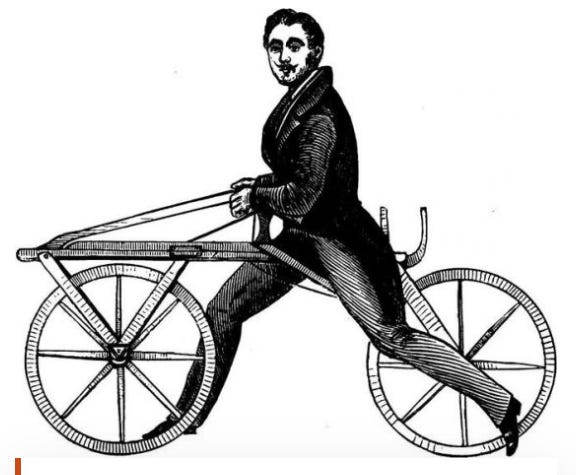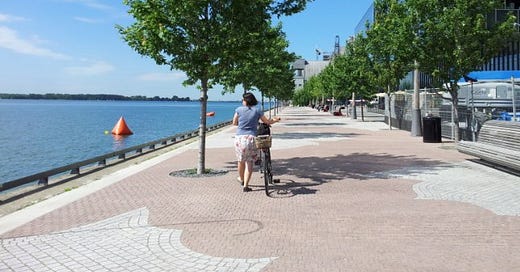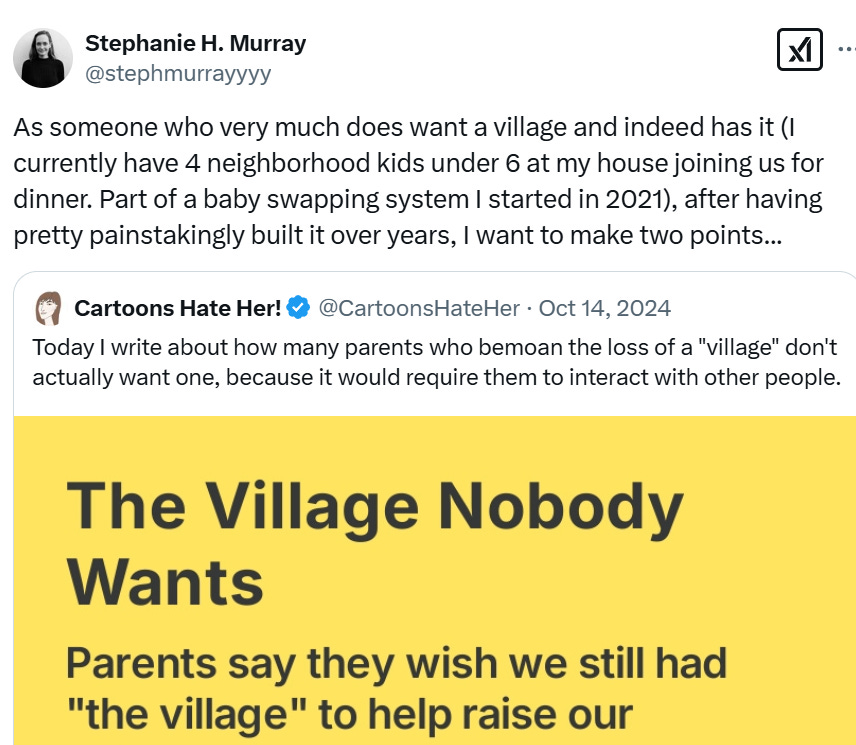Because political opinions come in bundles these days, and a lot of politicians and media buy and in turn offer them wholesale, voting in the last mayoral election was a difficult decision to make. People like Anthony Furey and other candidates described by the media as being “on the right”, who hold a lot of sane views on deregulating tendering, pruning the DEI bureaucracy, and densifying the yellow belt - also, as the night follows day, subscribe to the knee-jerk anti-cycling mantra rip out the bike lanes and advocate for untrammeled driving. Let’s free the municipal governance from the vested interests running this town for decades! and also, um, get those irritating two-wheelers off the road. How and why are the two compatible? Only people buying the bundle will know - and maybe they won’t either. (On the other side, the advocates for more cycling infrastructure also think we should make friends with drug users camping out in Toronto’s parks.)
In a bout of advance campaigning last year for the election that is happening right now, premier Doug Ford wheeled out the anti-cycling and anti-walking rhetoric and declared war on Toronto’s cycling infrastructure. Whereas on Doug Ford’s Conservatives’ watch the Ontario public school system has been reshaped by the illiberal successor ideology—and do we mention the ROM and the AGO’s attempts to “decolonize”, or Sir John A. permanently hidden in a box outside the legislature?—Ford would rather we talked about bike lanes and the minute or two they presumably add to driving on certain roads. No pasaran!
Does this genuinely fire up the Ontario Conservative vote? It certainly fires up certain segments of punditry, which was very busy last year publishing op-eds and tweeting about the marginal, nay eccentric activity that is cycling, and why should I as a tax payer. Inaccurate stats quickly became memes:
The insidious argument that all of us are funding, through taxes, this minority, fair-weather, not very sensible activity, and why should we - soon became the loudest. The dreaded childless then appeared in the Discourse, imposing the cost of their lifestyle on everyone else:
It’s like the anti-cycling provincial and municipal (I would say ‘right wing’ but one of the most cycling-indifferent Toronto administrations was David Miller’s in fact, so again - unbundle, always) commentariat and consultancy blob dreams of a more feudal, strictly identity-driven distribution of government funds. Those who use the service are those who pay for the service dammit. It’s an interesting game that could be played in all directions. Why would someone who doesn’t drive every day and doesn’t drive on the Gardiner specifically pay, via their taxes, for any road maintenance, let alone the Gardiner? (User tolls paying for expressways? Listen.) Why would people who don’t read books be paying (again, via universally distributed taxes) for the existence of libraries? Why would the childless be paying for the existence of maternity wards? Those who don’t use their services paying for psychiatry and addiction treatments? Hell, healthy for hospitals in general? Young for the old? My ethnic group for yours?
Never mind the bureaucracy required for determining which segment of the population should benefit from which taxes.
Put something of value into the public conversations, or go home.
I have been trying to steel-man, no actually, to imagine what a good conservative argument against giving citizens the freedom of travelling from point A to point B on a bicycle would be, and I’m drawing a blank. If you know of such a thing, send reference. In a great number of large cities of the developed world, to be in favour or against biking is not a partisan-political divide. No one wants people dying on the roads. (Between Jan-Sep 2024, 12 pedestrians and 6 cyclists dead in Toronto.) No one thinks cycling is a self-harming choice, like smoking or drug use, which should be discouraged. The speedy food delivery has added another layer of demand for a functioning cycling infrastructure; if you regularly order restaurant meals delivered to your door, you are a bike lane user.
There are conservative arguments to be made in favour of cycling and cycling infrastructure, and I am awaiting for someone to articulate them (but I guess the Cons don’t need the urban vote... ahem). Libertarian conservatives, I thought, would understand cycling because it’s entrepreneurial and hard working; it’s the vision of a free individual against the larger forces. A hero’s journey through wild, wild west, an explorer mapping out the territory. One of the key figures of Thatcherism and one of the few in the then-Conservative party leadership, like Thatcher herself, who came from outside of the Old Boys network, Norman Tebbit, gained some notoriety in his time for saying in an interview that the unemployed should get on a bike and find work. This oldie imagery actually came to Tebbit via his own father who indeed did get on a bike to look for work - and then commuted on it too. Biking in England, until the nineties I would gage, had a working people, small town and regions pedigree and did not evoke the urban lycra-clad weekend warrior with an academic or consultancy day job.
Communitarian conservatives too could get cycling and the need for it. Let me show you one way. Is the declining birth rate on your radar as a social issue? Then you could have done much worse than to follow the debate that erupted among parenting writers and bloggers in fall last year on what “it takes a village to raise a child” actually means in our time. Responding with agreement to the post by the popular Substack Cartoons Hate Her on how today’s parents praise the village but make it impossible and undesirable, the Atlantic writer Stephanie H. Murray shared how she managed to create a parenting village for her children.
In essence, the ‘intensive parenting’ and ‘gentle parenting’ are incompatible with village type parenting. The typical parenting duo of today want to make all the decisions and ensure all the good things every minute of the day for their child and this is the opposite of the more loose and make-do village and mixed-classes parenting. When all the neighbourhood kids are at her place, other parents know and accept that she won’t make them anything fancier than pasta. When her kids are at their friends’, she’s aware that they’ll be watching more TV than they normally do in their own home. And so on.
And then she said something that made my urban planning feels go abuzz:
Of course! It is extremely difficult to build any kind of parenting village in a car-dependent community, be it a sprawling village where you have to drive to the shops, or any kind of car-dominated urban environment. There’s been a lot of conspiracy theorizing around the 15-min cities, just an astounding amount of madness, whereas in the pre-internet times, communitarians would have jumped on this issue and appropriated it immediately. For a village to be there to raise a kid, it must be a walkable, bikeable and dense village, a “place-based” community.
II.
The left, too, need to clear up their thinking on cycling. The pro-cycling advocates often given media pulpits sound like bicycling is making them better than you. We are saving the planet, reducing car exhaust, cleaning the air, only a fool would refuse enlightenment. Our habit too is to divide into identitarian categories no matter the issue, so the conversation reduces itself to “the cyclists” vs “the drivers”. In reality, most people in Toronto overlap, something neither the bundled left nor the bundled right gets. Cyclist is not an identity (nor is driver), coming with a firm set of commitments and preferences. Cycling is a means, and so is the car, and sometimes people cycle and other times (small children, stuff to lug around, age and disability) drive. Most people would be both as well as “pedestrian”, at different points in their lives or simultaneously — except very early and very late, when you need to be driven around. I would bet that the stronger the categorical delineation of the figure of the cyclist, the weaker the cycling options in a city. The better we blend in as part of the city’s road menagerie, as in Paris for example, where buses, bikes and taxis often share designated lanes, the better we do.
Pro-cycling advocates should cool it off on the righteousness of cycling and emphasize its efficacy and the pleasure. Which brings me to the main reasons I cycle.
It’s the most efficient way to move around Toronto, including some parts of Etobicoke and Scarborough. It’s really as simple as that. (North York is a harder proposition unless you e-bike, though it’s exactly in e-biking that I’ve seen the greatest growth post-covid.) Most of us will have the distance limit we’d go on a bike, though a lot of us will live and work within this bikeable diameter. If you do, I’m not sure why you’re torturing yourself taking any other transit option in temperatures above 0C. The TTC has never been in a worse shape, the Eglinton light rail is coming to us with Godot. Car traffic in Toronto is out of control inefficient outside Sunday mornings or late night hours and parking is a headache. Biking is also the most easily abandonable and pause-able: you can get off the bike and walk it across sidewalks or meadows or sport fields, though narrow passages, out of the clogged intersections, or just tie it up somewhere and switch to another mode.
It’s also the cheapest. The amount of money you save is not negligible. No technological upgrades needed. No push to digitize any aspect of it. No GPS school-marming you. (If you’re cycling in an unfamiliar city, City Mapper is an app that’s continuously improving its cycling options and Google maps will also do in a pinch, but I found that still nothing beats printed maps in accuracy and local knowledge.)

Cycling is also the most pleasurable way, of all available, for medium to 10k trips. (Again, the upper limit debatable, as is the temperature, which for me hovers around -2C.) I never feel like my life is slipping away and I’m dying a slow torturous death—or that I’m being treated like cattle—when I’m on a bike, whereas I do feel this often when I’m on the TTC vehicles or in a car in slow traffic. Too, some of the newly established lanes, which will be apparently coming down if Doug Ford has his way, are such a beautiful experience that they should be advertised as tourist attractions. The University ride from Bloor to Adelaide is a very pleasant route full of interesting references points and potential stops, for example, but nothing in the strictest downtown beats one the oldest lanes, the eastbound Adelaide. Adelaide track has been frequently disrupted, unfortunately, and chopped up for city works and condo development, so we tend to avoid it, but when it’s functional, as right at this moment, it’s spectacular. Get your tourist friends to bike with you from Bathurst to Parliament, at night preferably, when the public art is lit up and the lobbies of the towers are showcasing their fancy mid-century modern stylishness and extravagant chandeliers. Toronto actually looks handsome from the Adelaide lane. The western and eastern ends of the Martin Goodman Trail by the lake are also always worth a ride but the middle section is out of commission thanks to the rewilding the Don business, and the bit that passes by the future Therme Spa has never been particularly nice. One of the earliest bike lanes in town, the Davenport track, is one of the most difficult rides to tackle and I would not recommend it unless the city physically separates it. If that’s ever done, it too could be a stress-free, enjoyable ride that includes Wychwood Park, Austin Terrace, Casa Loma and Spadina House.
Buying my first bike in 2009 and abandoning the TTC for it made me realize I didn’t know my own city at all. Cycling brought new knowledge - a whole new city, under the vague, foggy one you get through the bus, subway or car window. A map of alleyways opened up, of one-way streets and cul-de-sacs, of gravel roads, desire paths, shortcuts through parking lots and playgrounds and inner courtyards. Bicycling gave me a previously unexperienced degree of freedom of movement through this large and unruly city. I started spotting bike-pushing tracks on the side of steps leading up to bridges, and the street furniture and poles suitable for chaining, and human-size holes cut through the fencing around the rail tracks, cemeteries and golf courses. I finally had a good reason to ditch the fussy clothes. Would you rather look pretty or move freely? What do men choose?
But it really doesn’t have to be anything as pompous as freedom and knowledge. It’s mostly, for most people, me included, because there’s no other way to visit all of the five stores within a particular diameter that sell all these ingredients that I need for meal planning. You certainly can’t drive and park, drive and park, in search of the shoes that you need, or trundle in a car from Queen Books to Ben McNally’s to Chapters at Eaton Centre in search of that book that you’d rather not order from Amazon. Often there’s no better way to get to or from work, even when its raining. Small everyday and practical is what cycling is about. Practical is enough. We live in the ever complexifying systems (health, transit, security, communications, education, media), helpless before our digital overlords, outsourcing brain functions to GPS and AI. On a bicycle you know where you are and what you’re doing. You’re working for your travel and you can see the fruit of your labour. On a bike, you are always by definition working class and also always a noble knight on his trusty steed, writing up page by page, ride by ride, your own picaresque.








Really appreciate this lucid take. I haven't seen anyone else make what might be called a conservative case for cycling -- which really is kind of strange in light of the excellent points you make. But as you note, we are all ideological basket cases now.
I'm a long-time commuter cyclist, and now a new driver at midlife. My view is that congestion's killing movement in Toronto, but not because of bike lanes -- it's chronic and worsening management at the TTC and Metrolinx (transit is currently completely unreliable: no wonder anyone with the option drives), and the near absence of City oversight re costs and completion times over roadwork and large-scale building projects -- roadwork slowing traffic while progress crawls, and condo projects closing curbside lanes along major arterials for months or years at a time. Basically: unaccountable and imperious administrations are choking us to death.
Thanks for this. I do abandon my bike when the snow starts because I live north of St. Clair and there’s that hill down to Davenport. I miss the exercise and resent the need to use transit. Sometimes it’s crowded and I can’t even read. The worst!
Certainly I understand why people use cars to travel >10km distances, or need the space for kids and weekly grocery runs, but bicycles are such a neat solution for quick trips. Car owners complaining about cyclists strike me as motor boat owners complaining about canoeists. Cyclists don’t have traffic jams—except maybe on College Street during rush hour—and we can portage. It’s an ideal form of transportation no matter what the political stripe.